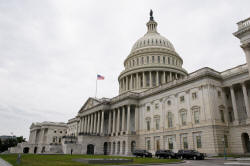|
Following long work sessions on Saturday and Sunday, Senate
negotiators announced that they had finished drafting a
2,702-page bill, which promptly was introduced, clearing the way
for senators to debate amendments.
"It has been decades - decades - since Congress passed such a
significant, stand-alone investment," a buoyant Senate Majority
Leader Chuck Schumer said.
"In the end, the bipartisan group of senators have produced a
bill that will dedicate substantial resources to repair,
maintain, and upgrade our nationís physical infrastructure," the
Democratic leader added.
The legislation, if enacted, would be the largest U.S.
infrastructure investment in decades. Its passage would mark a
major win for Biden and the deeply divided Congress, on the
heels of a Democrats-only $1.9 trillion economic stimulus and
coronavirus aid bill enacted this year.
It also would clear the way for Democrats, acting without
Republican support, to begin work on a budget framework that
would sketch out plans for a $3.5 trillion "human
infrastructure" bill.
It would shovel federal dollars toward fighting climate change,
help millions of immigrants gain legal protections and fund
expanded healthcare, including for senior citizens in need of
assistance at home.
But first, the Senate needed to put the finishing touches on the
approximately $1 trillion in federal funds for construction
projects that would upgrade the nation's aging roads, bridges
and rail lines and expand high-speed internet access to rural
areas where economies have been hobbled by old technology.
The legislation also would help build a national network of
electric vehicle charging stations and replace lead water pipes,
although at levels lower than Biden had originally sought.
In a rare sign of bipartisanship last week, the initiative won
early support from enough Republicans to begin debate on the
bill. Barring surprise developments, the bill could be ready for
a final vote as early as this week, according to some senators.
(Reporting by David Morgan and Richard Cowan; Editing by Robert
Birsel)
[© 2021 Thomson Reuters. All rights
reserved.] Copyright 2021 Reuters. All rights reserved. This material may not be published,
broadcast, rewritten or redistributed.
Thompson Reuters is solely responsible for this content.

|
|





